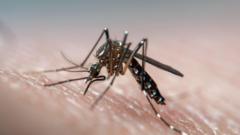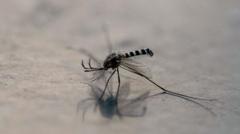In an unexpected twist in the fight against mosquito-borne ailments, scientists have turned to a novel strategy: making male mosquitoes deaf to hinder their reproductive success. This innovative approach aims to combat diseases such as dengue, yellow fever, and Zika by disrupting the mating patterns of these insects, which are responsible for infecting approximately 400 million people annually.
Researchers at the University of California, Irvine, focused on Aedes aegypti mosquitoes, which are notorious for transmitting viruses. Observing their unique mating habits—where males rely heavily on sound to locate females by their characteristic wingbeats—scientists manipulated a genetic pathway linked to the insects' auditory processing. By modifying a protein known as trpVa, crucial for sound detection, they effectively rendered the male mosquitoes incapable of hearing.
In controlled experiments, these genetically altered males displayed no attraction to female wingbeats, failing to mate even after prolonged exposure in cages. In contrast, wild-type males copulated frequently and successfully fertilized nearly all females present. The findings, published in the journal PNAS by researchers from the University of California, Santa Barbara, demonstrate a complete elimination of mating among the deaf males.
Dr. Joerg Albert, an expert on mosquito reproduction from the University of Oldenburg, highlighted the significance of this research. He emphasized that while sound plays a crucial role in mosquito mating, further studies are essential to manage this approach effectively. He warned that disrupting the male's auditory abilities could lead to a decline in female populations, potentially threatening their existence.
In addition to the deaf mosquitoes strategy, the research community is also exploring the release of sterile males in regions plagued by mosquito-borne diseases as another potential control method. Despite their role as disease carriers, it's important to acknowledge that mosquitoes play a vital role in the ecosystem as prey for various animals and as pollinators. The complexity of mosquito biology presents both a challenge and an opportunity for researchers seeking to mitigate the public health threats posed by these insects.






